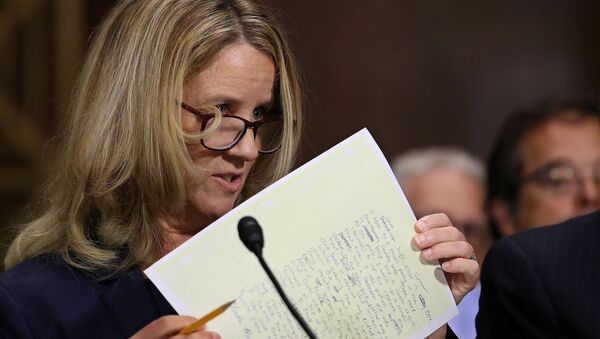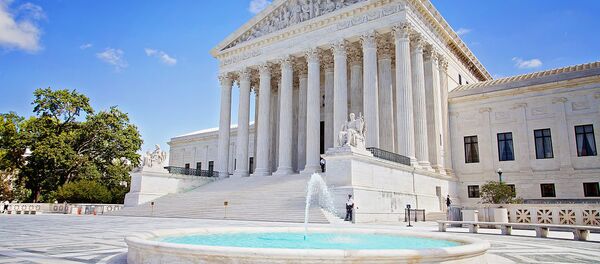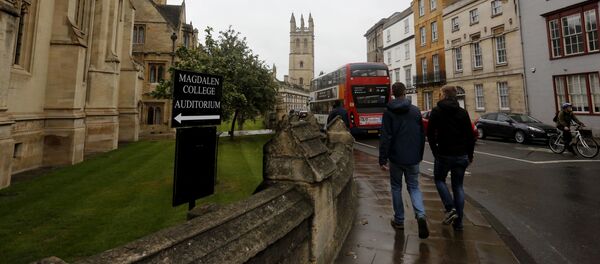Ford, an American professor of psychology at Palo Alto University and a research psychologist at the Stanford University School of Medicine, told senators that she was "terrified" but felt it was her "civic duty" to testify. She said she "agonized daily" over whether or not to come forward, fearing "my single voice would be drowned out."
Kavanaugh, a US Circuit Judge of the United States Court of Appeals for the District of Columbia Circuit, denied the allegation "immediately, categorically and unequivocally." Calling the proceedings "a national disgrace," he indicated he has no intention of withdrawing his nomination.
While Ford was the first, she is far from the only woman to come forward with allegations about Kavanaugh's sexual misconduct. Three other women have also made allegations, including that he exposed himself to them and that they witnessed him taking part in gang rapes of drugged girls in high school, Sputnik reported.
Sen. Lindsey Graham Blasts "Sham" Kavanaugh Hearing: "This is not a job interview, this is hell!" pic.twitter.com/u4iamAZPbl
— Breaking911 (@Breaking911) September 27, 2018
Meanwhile, Republican senators and US President Donald Trump rallied to Kavanaugh's defense, with South Carolina Senator Lindsey Graham calling the investigation a "charade." Trump tweeted Thursday evening as the hearings ended that "Kavanaugh showed America exactly why I nominated him," saying that testimony was "powerful, honest and riveting."
Judge Kavanaugh showed America exactly why I nominated him. His testimony was powerful, honest, and riveting. Democrats’ search and destroy strategy is disgraceful and this process has been a total sham and effort to delay, obstruct, and resist. The Senate must vote!
— Donald J. Trump (@realDonaldTrump) September 27, 2018
Heidi Boghosian, the executive director of the AJ Muste Memorial Institute and the former executive director of the National Lawyers Guild, and Mara Verheyden-Hilliard, the executive director of the Partnership for Civil Justice Fund, spoke with Radio Sputnik's Loud & Clear Thursday, while the hearings were still ongoing, about the event and what it represented for women watching it.
Boghosian told host Brian Becker that Ford has a "disarming honesty" and that her "forthrightness" and "neighbor-next-door persona" did much to dispel beliefs that she had been "put up to this."
"Any woman watching this has to be thinking," Verheyden-Hilliard said, that the whole episode "really confirms why a woman does not come forward and talk about being sexually assaulted, because this is what you get put through."
"Who would do this to themselves?" she said, "What she's having to go through, what her family's having to go through because she's talking about an assault on her. And bringing in this prosecutor to cross-examine her because they didn't want to have the image of these old white men sitting there cross-examining her, so they thought they could bring in a woman and make it look better; I don't really think it makes it look any better."
The questions, Verheyden-Hilliard said, aimed to "go through [Ford's] underwear drawer… to humiliate her; it's to catch her." Verheyden-Hilliard noted that the wording Mitchell chose was recognizable to her as a lawyer: "They were the very same phrases that we all do when we're conducting deposition. Her opening comments are the type of comments you prepare in advance of a record." Verheyden-Hilliard recalled from her own experience that "this is exactly what attorneys on the other side do, that are defending racists, sexists, corporations, against people that have been subjected to this, which is trying to peel apart everything they say and set them up to find the most minor, immaterial inconsistency or alterations, so that then they can say, ‘Aha, this means you're a liar.'"
"There's nothing of substance that has come out of anything that Rachel Mitchell asked, that appears to matter."
Boghosian noted that Ford's attention to detail helped to defuse Mitchell's cross-examination, as Ford was able to provide accurate information about "the pettiest details" the prosecutor focused on, including rewording her statements to be more precise or more easily understandable when questions were repeated.
Verheyden-Hilliard said that the attitudes shown by both parties about Kavanaugh and Ford reflect those shown by them at past sexual assault proceedings, recalling how Anita Hill came forward during Clarence Thomas' confirmation hearings to become a Supreme Court justice in 1991, but Democratic Senator Joe Biden blocked the ability of other women to testify on Hill's behalf and corroborate her story.
One is also reminded of Juanita Broaddrick, who in 1999 accused then-President Bill Clinton, a Democrat, of having raped her in 1978. Outside the Senate building in Washington, DC, on Thursday, Broaddrick told the media that Democratic Senators Dianne Feinstein and Chuck Schumer showed "the biggest double standard I've ever seen" by believing Ford's story but not hers, when as she said, "I had the who, what, when, where and how." Broaddrick also implied that Ford had less evidence than she had, Sputnik reported.
"We really haven't made that much progress since Anita Hill," Boghosian said. "There's a lack of honesty in our judicial system; the rule of law means nothing to those in power. It seems everyone is looking out for their own individual interests."
"This is something we have to take into our own hands to change," Boghosian said. "Every time a woman steps forward with the courage to share her story, we inch forward, but incrementally. You would think that the #MeToo movement and the events of the last year would hold our leaders more accountable for being responsive to these really treacherous allegations."
"Historically, if you were subject to harassment, abuse, assault, and you wanted to speak out about it, so often we're all trained to know that we're immediately going to be cross-examined, even by our friends and our family, that the first questions are ‘What did you do to deserve it,' ‘What did you do wrong,' ‘How were you complicit in criminal or awful acts against you,'" Verheyden-Hilliard said. "That's how women have thought. And women so often don't even tell their close friend about things that they've endured and things that they've gone though. That's what's changed."
"Once women speak out, once anyone who is suffering under oppression begins to speak out, and hears all of these other voices around them also speaking out, that is the most empowering, powerful act that can happen in changing consciousness and in changing society. And that's what happening with women standing up against powerful men… who are either powerful in a larger way in our society or simply powerful in their own lives, in saying, ‘You've done this, I'm gonna talk publicly about it, I'm not gonna let you get away with, I'm not gonna be silent.' That changes everything."





